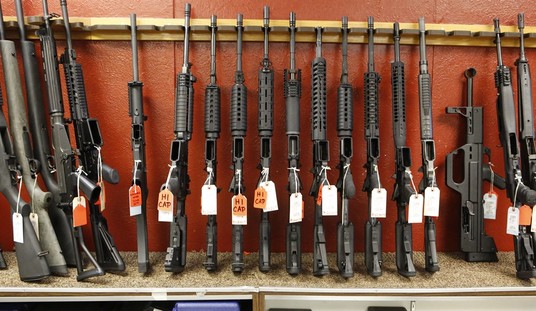When the Department of Justice published a notice in the Federal Register this week informing the public that the right to keep and bear arms had been restored to ten individuals, almost all of the media attention that ensued focused exclusively on actor Mel Gibson, who became prohibited from possessing a firearm after pleading no contest to a misdemeanor charge of domestic battery in 2011. But who are the other nine individuals who regained their rights through a process that has existed on paper but been inert for decades?
USA Today's Nick Penzenstadler spoke with at least two of the nine individuals, one of whom apparently had no idea he was no longer a prohibited person.
The list includes former Iowa banker Charles E. Moehring, Jr. who faced a felony in 1999 for falsifying the bank’s board of directors meetings and filing inaccurate call reports.
Moehring, who now lives in Wisconsin, said he received news at the end of the Biden administration that his application for a pardon was officially declined.
Then, weeks later he received a call from the Trump administration DOJ that a new pilot program was underway to restore some of his rights, including to own a gun.
Moehring, 74, said he had not heard of the controversy with the pardon attorney — or that his name appeared alongside the famous Braveheart actor, “I’ll be darned,” he told USA TODAY.
He said he didn’t necessarily plan to immediately purchase a firearm.
“At this point, I don’t know that I will. It’s been 20-some years since I’ve been hunting,” Moehring said. “I guess I wanted to have the opportunity to teach my grandkids how to properly carry firearms.”
Another former gun owner, 65-year-old Ron Willkomm of Georgia, told Penzelstadler that he's hoping to once again be able to hunt rabbits and deer now that he can legally purchase and possess a firearm. Wilkomm didn't disclose what caused him to forfeit his Second Amendment rights other than telling Penzenstadler it was the result of non-violent crimes (plural) dating back nearly 30 years.
The only other name on the list that some folks might recognize is Joseph Klecko, a member of the Pro Football Hall of Fame who received a three-month prison sentence for false testimony to a federal grand jury regarding insurance fraud more than 30 years ago.
It's silly that a relatively minor (and definitely non-violent) offense like that should lead to a lifetime ban on possessing firearms, but until Attorney General Pam Bondi announced that the DOJ would be directly administering the restoration process instead of the ATF, which had been prohibited for decades from carrying out that task through congressional budget appropriations, there was essentially no way other than a presidential pardon for prohibited persons to claw back their right to keep and bear arms.
According to Penzenstadler, most, if not all, of the folks on the DOJ's list had previously applied for pardons but had been turned down. The USA Today reporter notes that they "are all white, mostly retired, with no documented ties to government or the Trump administration," at least beyond Gibson, who was named a "special ambassador" to Hollywood by Trump earlier this year.
Stephen Stamboulieh, a Mississippi-based Second Amendment attorney, immediately worked with a gun blogger to file requests with the DOJ to reveal how the department came to the conclusion to restore the rights.
“This is a really big deal,” Stamboulieh said. “They haven’t issued any guidelines on how to apply. All we’re going off of is the list of nine people. We don’t know what they were convicted for or when.”
Gun safety groups have blanched at the prospect of giving back rights to those who have lost them.
“It’s going to open the floodgates,” said Kris Brown, president of the gun violence prevention group Brady. “It’s deeply troubling when you consider whose rights we’re violating. The victims of these abusive relationships have the fundamental right to safety and to be able to sleep at night.”
Brown is understandably harping on Gibson's rights restoration because it's much easier to argue that someone convicted of domestic violence, even a misdemeanor offense well more than a decade ago, shouldn't be able to own a gun than it is to say that someone who lied about insurance fraud when Bill Clinton was president should forevermore be prohibited from touching a firearm, much less owning one. And given Trump's friendship with Gibson, I think it's fair to ask whether or not that was the deciding factor in his inclusion among the first batch of citizens to have their Second Amendment rights restored by the DOJ.
As Stamboulieh says, we don't really know what criteria the DOJ is using to come up with candidates or how to request relief from the agency. None of the ten appear to have specifically applied to have their Second Amendment rights restored, and instead were apparently chosen at least in part because they had mentioned their desire to possess a firearm as part of their pardon application. Besides Gibson, I don't think anyone outside of the gun control lobby is going complain about these folks being able to buy, keep, and carry a gun going forward, but we do need to know more specifics about how this process will work and how many other citizens who've served their time the DOJ plans on helping out in the months ahead.









